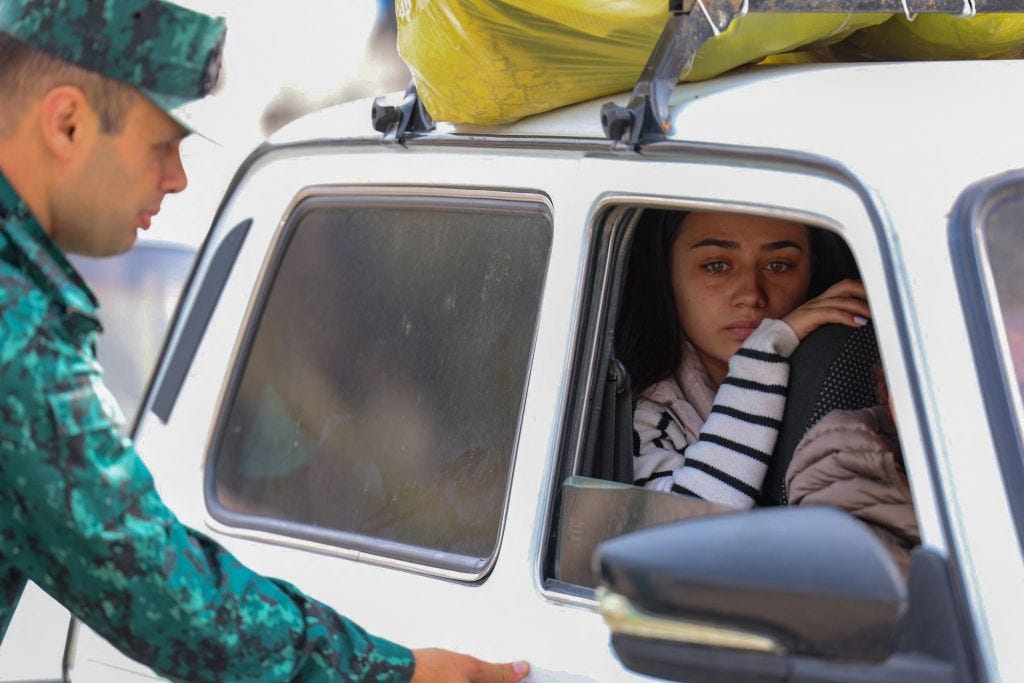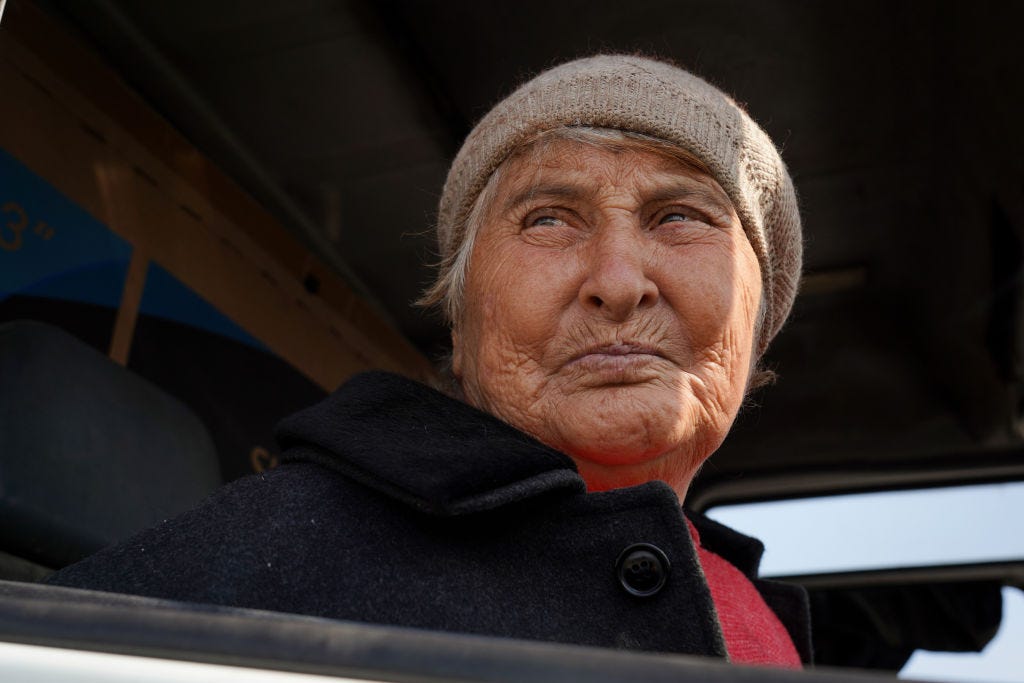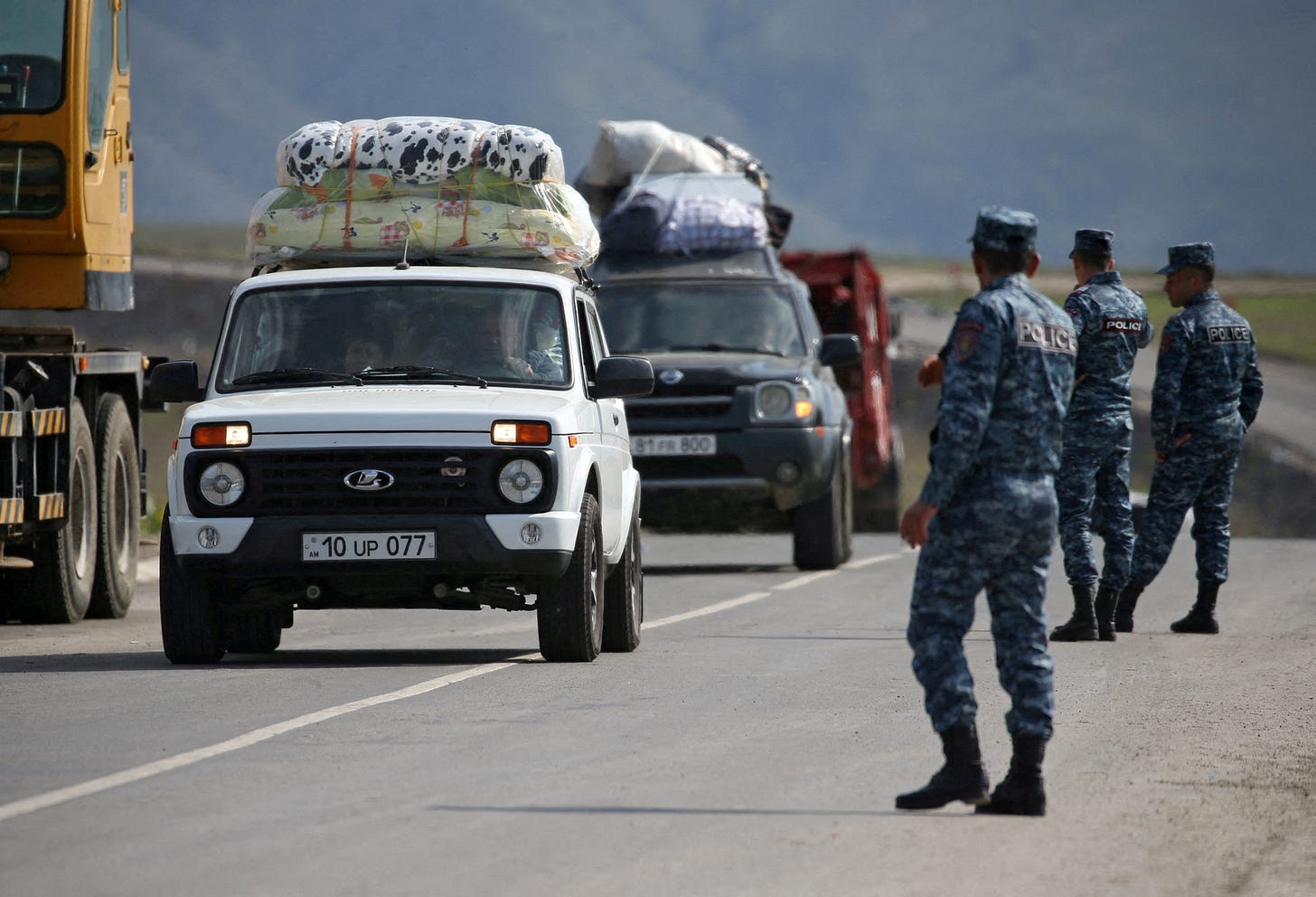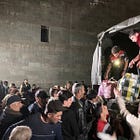Azerbaijan’s Karabakh challenge: a genuine commitment to change, or more empty words?
BBC Russian speaks to Georgia’s last Minister for Reintegration and a leading specialist on the conflicts in South Caucasus, Paata Zakareishvili about the future of Nagorno Karabakh.
By Famil Ismailov.
Almost all the Armenians living in Nagorno-Karabakh have now left the disputed enclave since Azerbaijan retook control in a lightning military operation on 19 September. After three decades of bloodshed, mutual mistrust and hostility people unsurprisingly were not willing to test Azerbaijan’s promises that their safety and rights would be guaranteed. Could Azerbaijan convince them to return and what would ‘reintegration’ look like for the Karabakh Armenians? BBC Russian spoke to one of the people in the South Caucasus most qualified to answer that question, Paata Zakareishvili, a civil society activist and Georgia’s last Minister for Reintegration.
Paata Zakareishvili has spent much of the past three decades working on conflict in the South Caucasus and trying to bring peace to a region which has seen too many lives lost in separatist wars. A philosopher by education, his journey into peace-building began negotiating the return of missing people and prisoners of war during the brutal 1992-93 Georgian-Abkhaz war.
He went on to set up the Institute for the Study of Nationalism and Conflict and has played an active role in civil society initiatives to bring Georgians, Abkhazians and South Ossetians together. In 2012 he made the move into politics, becoming the country’s last minister for reintegration. His job was to try to find a way to build peace with Georgia’s two breakaway regions of Abkhazia and South Ossetia and ultimately to bring them back into the fold.
Zakareishvili worked with three prime ministers before eventually leaving the government in 2016. During his time in office he established some important new approaches to Georgia’s attempts to resolve the conflicts with Abkhazia and South Ossetia. He began by questioning the whole idea of ‘reintegration’, rethinking the roadmap and the time-frame for rapprochement and even changing the name of his own ministry to better reflect the challenges and realities of trying to build a just and lasting peace.
BBC is blocked in Russia. We’ve attached the story in Russian as a pdf file for readers there.
Why reintegration should come last
BBC: When you accepted the position of minister in 2012, the first thing you did was to change your job title, rebranding the Ministry of Reintegration, as the Ministry for Reconciliation and Civil Equality. Why was this so important to you?
Paata Zakareishvili: Because reintegration is the final phase of conflict resolution. In 2012, when I was appointed, there was no talk of reintegration with the Abkhaz and Ossetians. They didn't engage with us at all. Personally, I might have had good relations with some of them, but after I was appointed to a role that was completely unacceptable to them, they refused to communicate with me in an official capacity. Informally, sure, we could still talk on the phone and so forth, even in Georgian. So, I spent an entire year changing the name of the ministry.
As soon as I changed the name, negotiations and contacts with the Abkhaz and South Ossetian sides began. I believe we wasted a whole year, but what can you do?

I am not against reintegration, but it must be mutual, voluntary, and mature. In Georgia, the situation had not matured yet. I started from the premise that the sooner we address and resolve issues of civil equality, the easier it will be to handle conflicts later on, so to speak, because these issues in Georgia are quite complex. I believe that only through peaceful means, without rushing, we must gradually address and resolve these issues.
In the context of the current situation of Armenian-Azerbaijani relations within Azerbaijan, in the Karabakh context, and the Ukrainian context, we need to reevaluate the new reality and make the right decisions accordingly.
“Аzerbaijan needs to prove to the world that it genuinely wants ethnic Armenians to remain”
BBC: Speaking of the Karabakh conflict: the first negotiations have taken place in Yevlakh, but it there is a long way ahead in the process. However, the first step has been taken. In your view, what is the biggest challenge for Armenians and Azerbaijanis in Karabakh in this process?
Paata Zakareishvili: The biggest challenge is for Azerbaijan to decide what status it chooses: is it truly integration, or are these just words, and the real intention is to expel ethnic Armenians from Karabakh? This is a crucial point, and we will find out in six months.
How an integration process could work
BBC: What would integration look like, in your view?
Paata Zakareishvili: If Azerbaijan chooses an integration strategy, they need to prove to the world that they genuinely want their citizens, the ethnic Armenians, to remain in Azerbaijan.
They should say: we acknowledge that this is a difficult situation, that a lot of blood has been shed, and trust between us is very low. Therefore, we are not insisting on anything. We understand you, so for those who want to live with Armenian citizenship, we are proposing a transitional period for them, perhaps five or ten years, during which you can continue to live in your homes and be as safe as possible. However, if you obtain Azerbaijani citizenship, you will receive certain preferences, meaning positive discrimination will be applied.
We will do everything to protect the Armenian language, your church, and other fundamental identity values, and we will facilitate the opening of the Lachin checkpoint, allowing you free access to Armenia.
Those who acquire Azerbaijani citizenship will have advantages when it comes to university admissions, economic activities, access to the banking system, travel abroad, political rights, and employment in Baku or other regions. These points should be communicated.
Then, there's the question of how the police and local governance will work, how people will pursue their aspirations, and how military conscription will be organized, where young Armenians will serve. I believe there should be a moratorium, at least for a minimum of five years, to avoid conscripting them and to allow them to adapt to their life in the new state, thus eliminating hazing or unauthorized practices.
Bullying will exist in some form in various places regardless. It's impossible to completely eradicate it at the level of ordinary people. But the most crucial aspect is how bullying is addressed, both in the military and in other areas.
“It is essential [for Azerbaijan] to make some serious statements… but I do not see any indications of steps in this direction at the moment. I will be very happy if I am mistaken.”
Historic opportunity
Paata Zakareishvili: In theory, we have the European experience when [German Chancellor Konrad] Adenauer and [French President Charles] de Gaulle decided that the French and Germans couldn't continue to live like that - two world wars had passed, and terrible things had happened. And they created a new Europe.
President Ilham Aliyev has a unique opportunity, unfortunately, I don't really believe it is going to happen right now, but he does have a unique chance to say: "That's it, we must end the centuries-long misunderstanding between Armenians and Azerbaijanis. And let it happen while I'm still young and energetic."
Let this issue be resolved and formulated with a new wording that, like in Europe, relegates the Armenian-Azerbaijani conflict to the archives of history forever. Let it be a terrible dream in our history.
This is a historic opportunity, and no one else will have such a chance, either he lifts this bar or no one will, at least not in the near future. Therefore, it is essential to make serious statements in this direction. But I do not see any indications of steps in this direction at the moment. I will be very happy if I am mistaken.
BBC: It's clear that this is a two-way street, and Armenians must also take some steps. They are currently in a difficult situation because they feel like victims, defeated, and so on. In your view, what steps could help Armenians in Karabakh and Armenians in Armenia overcome this situation and take steps toward Azerbaijan?
Paata Zakareishvili: I may be repeating myself, but the first step must be taken by Azerbaijan because it concerns the territorial integrity of Azerbaijan and its national sovereignty.
The second step, in response, must be taken by ethnic Armenians who want to stay in the territory of Azerbaijan. They currently have fears about their future, but there is also hope that these fears may not be justified. Therefore, among Armenians, both in Armenia and in Azerbaijan, there must be free exchange of opinions.
“We need to eliminate forever the idea that if the majority doesn't like something, then the minority are traitors.”
There should be freedom to discuss issues related to the lives of Armenians with Azerbaijan, both as neighbours and as citizens of Azerbaijan. These should be open, frank, and honest conversations both within Armenia and within the diaspora.
Armenians should have the opportunity to freely discuss these issues publicly in Baku and with their neighbours. In other words, the ban on discussing these topics in Armenia, which labels anyone who speaks out as an Azerbaijani spy or a national traitor, should be lifted.
I say this as a Georgian not only because we have experienced this as well, but we are still living with it, so we haven't gone far from each other on the Caucasus. In this sense, I believe that we are very similar to each other, both in a good and bad sense. One of the bad traits that we need to eliminate forever is the idea that if the majority doesn't like something, then the minority are traitors. This should not exist. Armenians now have a unique chance to overcome this, because this Bolshevik mentality influences individual decisions of citizens in both Azerbaijan and Armenia, and Georgia, of course.
“Wherever Russia is involved, there are always problems; ultimately, they do not allow people to live in their own way.”
Secondly, Armenia must see itself as a political actor because it has been an object of Russian politics until now. Maybe my words will seem Georgian-centric to someone, but that's not the case. I think wherever Russia is involved, there are always problems; ultimately, they do not allow people to live in their own way.
Therefore, I believe that Armenia should stop being an object of Russian politics and become an agent of South Caucasus politics in its own right.
This means seeking and finding common contacts with both Baku and Ankara and, of course, with Brussels and the European Union as a whole. I believe that the future of the South Caucasus lies through NATO and the European Union. Armenia could be one of the leaders in moving in this direction.
BBC: Over the past 30 years, we have seen that the international community and international mediators, including the OSCE Minsk Group, the European Union, the United States, and Russia, collectively and individually, have tried to change something in the Azerbaijani-Armenian conflict, but they have not succeeded. Or if they did, it was only temporarily. Judging by Azerbaijan's current position, it seems tired of this mediation and believes it can independently decide how to deal with sovereignty and the Armenian minority. It now considers the Karabakh issue its internal affair. What can the international community – including the United States and the European Union – do in this regard?
“For the first time in 600-700 years or more, the South Caucasus has three states left to themselves, but unfortunately, they do not always make the best decisions.”
Paata Zakareishvili: Yes, it's very difficult when you are not invited to be involved in the processes. In any case, nobody in the West is waiting for us in the South Caucasus.
We Caucasians like to talk about our unique history that spans many centuries. However, what is happening in the South Caucasus today has never occurred in the history of this region, not even in 600-700 years, let alone in the past 50 years.
What was then? There were three empires: two Islamic empires, the Persian and Ottoman empires, and then the Orthodox Russian Empire. These three empires somehow divided everything among themselves. Then came the Soviet empire, followed by the CIS. And for the first time in 600-700 years or more, the South Caucasus has three states left to themselves, but unfortunately, they do not always make the best decisions.
But now, no empire can dictate to us unless we invite them ourselves. For the first time in history, the three states of the South Caucasus can sort out all their issues among themselves.
I understand that there are many issues. Plus, there are some distant institutions, such as NATO, the European Union, and so on. The responsibility for our states – Georgia, Armenia, Azerbaijan – lies against this historical backdrop.
Perhaps now Azerbaijan has the first chance to resolve this conflict with Armenia. How will Armenia respond? Some synchronization of mutual policies should begin. Contemporary Franco-German and Anglo-French relations were also born out of difficulties. You see, we have examples, and we can move in that direction.
Depending on how these three states can find common parameters and values among themselves, we can then invite someone from outside.
Turkey and Russia – two elephants in the room
Paata Zakareishvili: It should be noted that for the first time in 100 years, Turkey has returned to the Caucasus. Some may like this, and some may not, but it's a reality. In this small room in the South Caucasus, there was only one elephant – Russia, and now, with Turkey, there are two elephants.
Against this backdrop, I believe that the three South Caucasus countries should decide who they want to see in the region and how to work with them.
Regardless of the order in which this happens, we must move toward Europe. No one will come to us insistently – they are not Russia. We must make ourselves attractive to Western, European, democratic institutions.
BBC: After Russia's invasion of Ukraine, it is increasingly isolated in international politics. Still, it continues to exert influence in the South Caucasus, with Russian peacekeepers present in Karabakh. Do you believe that Russia can influence Armenia and Azerbaijan in the process of reconciliation in Karabakh today? What role can it play in this?
Paata Zakareishvili: I think, in the context of Karabakh today, there are four players. One player, with two faces, is Azerbaijan and Turkey. Azerbaijan is pursuing its interests, while Turkey acts as a guarantor of security and shows everyone that it won't allow anyone to engage with Azerbaijan from a position of strength.
The third player is Russia, which is ready for any dirty actions, including "betraying" its ally Armenia, just to stay in the South Caucasus.
However, Russia has a problem in 2025 when the question of whether Russian peacekeepers will remain in Karabakh needs to be addressed, as clearly stipulated in the trilateral statement of 2020.
Two months ago, right after Turkey handed over former Azov Battalion fighters to Ukraine, [President Recep Tayip] Erdogan stated that there would be no Russian troops in Azerbaijan in 2025. Few paid attention to these words, even Aliyev did not make such a clear statement. Turkey certainly does not want to see Russia, at least in Azerbaijan.
But in Armenia, we also see concerns about this issue. Even if Russia stays in Armenia, and Armenia remains part of the CSTO and the Eurasian Economic Union, Armenian society no longer trusts Russia. This is essential.
So, I return to our first question: what is Azerbaijan's strategy? If its strategy is to integrate the Armenian population, then Russia is not needed in Karabakh. It will only hinder things there.
But if Azerbaijan's position is to completely push Armenians out of Karabakh, then everything can be blamed on Russia, saying that the guarantor of Armenian security failed.
Therefore, I believe Russia's place is north of the Caucasus. But for this to happen, the three countries – Azerbaijan, Armenia, and Georgia – need to unite their efforts and positions.
Read this story in Russian here.
English version edited by Jenny Norton.











